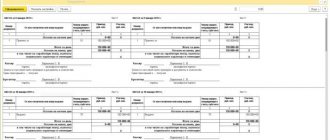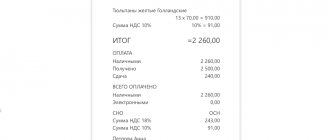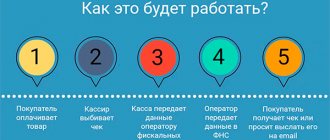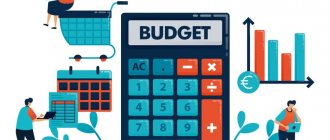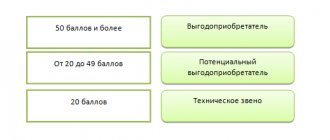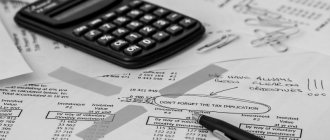The Federal Tax Service is the most technologically advanced public service in Russia. Online cash registers and ASK VAT 3 are evidence of this. The processes of companies' activities become transparent. If five years ago an inspector had to get wet to prove he was right, today it is enough to make a few combinations on the keyboard of a work computer - and voila! – the value added tax reimbursement scheme is downloaded onto the monitor screen.
In this article we will tell you what ASK VAT 3 is and how it works. However, this topic has a backstory.
What is ASK VAT-3?
The ASK NDS-3 software package is a new service of the Federal Tax Service of the Russian Federation. This is a computerized system that, based on the documents submitted by taxpayers (books of purchases and sales), builds the entire chain of their calculations and determines the discrepancy between them. The purpose of its creation is to fight fly-by-night companies and remove funds from the shadow sectors of the economy.
By fully automating control over counterparties' operations, it is planned to increase the efficiency of the process by 10 times (from 10% to 100%). ASK VAT-3 independently identifies contradictory information in the documentation of counterparties and generates a request regarding the found inconsistencies. The most unpleasant consequence is that since the end of 2017, the tax inspector has the opportunity to initiate a criminal case based on an automatic report from the ASK VAT-3.
"Technical" company - the beginning
A “technical” company is one where the tax office has discovered a gap. And if previously it was precisely such a company that was recognized as the culprit, now when a gap is discovered, the chain of all business contacts of this company begins to be worked out.
All information characterizing the role of each link is entered into the new system, which contains:
- in interrogation reports;
- in the Unified State Register of Legal Entities about the unreliability of information;
- in materials submitted to law enforcement agencies;
- in documents for cancellation of an electronic signature;
- in taxpayers’ responses to counter audits or outside audits.
The tax office will send requests for explanations to all counterparties. That is, now the culprit of the breakup will be the beginning of reaching the beneficiary.
Consequences for Poker Players
It would seem, why does the average poker player care about reconciling sales and purchase books if the main goal is to fight the shadow economy and fictitious companies? Alas, from the point of view of the legislator, income from honest grinding or winning a large MTT contains signs of money laundering and other illegal transactions.
In the recent past, the careers of the vast majority of professional poker players from Russia began with no deposit bonuses from poker schools and affiliates. Occasionally - just from a minimum deposit in a poker room. The player gradually trained, grew in limits, and followed advice on bankroll management. In short, he was the epitome of poker discipline and dedication. Let’s roughly assume that in two years he heroically covered the road from nl2 to nl200 and built himself a four- or five-digit bankroll. Then he decided to taste the result of his many months of work: he ordered a cashout and received his money. Previously, amounts up to 600 thousand rubles could be withdrawn without any problems.
In 2021 the situation is not so rosy. To make a deposit and link the payment method to the poker room, you need to complete a real quest. Moreover, every year the level of complexity in it becomes higher and higher. The conclusion is also fraught with problems - this is where ASK VAT-3 comes into play. Since 2021, it has a database of banks at its disposal. The likelihood that your poker profit will be considered questionable by the automated system is quite high. The prospect of communicating with the competent authorities after an ordinary cashout is not pleasant news.
Liability for non-payment of taxes in accordance with Article 122 of the Tax Code of the Russian Federation ranges from 20% to 40% of the unpaid tax amount. The amount depends on the intentionality of the act committed, so they are more likely to demand 40% - it is difficult to meet a poker player who has never thought about or heard about the obligation of individuals to pay taxes. The additional burden in the form of taxes and fines for arrears look unpleasant, but everything is not too threatening. But the sanctions of the Criminal Code of the Russian Federation for tax evasion are much more convincing:
- A fine of 100 to 300 thousand rubles or in the amount of salary / other source of income for one to two years;
- Forced labor for up to a year;
- Arrest for up to six months;
- Imprisonment for up to a year.
If you want to be recognized as a beneficiary
Unfortunately, everyone, including those who do not use any schemes, has the risk of falling into the attention zone of the VAT Control system.
If you are one of them, then you yourself will have to defend your interests - you rightfully have a chance to challenge the claims of the tax authorities.
Be sure to meet all inspection requirements. But know when to stop and try not to give too much information. Remember, it will all go into the database. Pay special attention to the reality of your transactions.
Start collecting evidence of the reality of the transaction and the legality of your actions not at the time of scheduling an on-site inspection, but when you receive the first VAT requirement from the inspectorate.
How to reduce risks at each stage of working with VAT? The main thing is to prepare the declaration correctly. Avoid errors and discrepancies in invoices. Respond quickly to inspection requests.
What should a poker player do?
Regulators have managed to make life significantly more difficult for people wishing to make a deposit on a gambling site. With the withdrawal of income from poker, things are a little better. At least for now.
The mentioned all-seeing eye of ASK NDS-3 is in the active stage of development and is operating in test mode. The poker community expects the finalization process to drag out; many hope that their income is not too significant. If you are not yet ready to legalize your legal status and income, then it is recommended:
- Avoid as much as possible the use of national payment systems
and foreign banking institutions that participate in the exchange of tax information with the Russian Federation. - Create accounts in international payment systems
such as Skrill, NETELLER, ecoPayz. We recommend ecoPayz due to its lower commission for currency conversion, as well as the availability of additional accounts in different currencies within one wallet. You can make deposits and cashouts using ecoPayz or the Skrill-NETELLER payment chain. - Whenever possible, use cryptocurrency for transactions.
Storing money in it is risky due to high volatility, but making money transfers is quite convenient.
Another option is to move to another state, where taxes are lower than Russian ones, or are not levied on poker income at all. In the UK, Italy, Ireland, Denmark, Austria, Estonia, Gibraltar and Latvia, poker players do not have to pay taxes on their gambling earnings. We are talking about winnings in poker rooms that have a local national license. On the other hand, living expenses in other countries may exceed the tax burden in Russia.
Owners of Skrill Mastercard Prepaid or NETELLER Net+ Mastercard Prepaid receive the most favorable conditions for deposits and cashouts. They are not delivered to Russia and Ukraine, so you can only get such a card through friends in the EU. But you can cash out money from it anywhere around the world, including in the Russian Federation.
The last way to resolve the tax issue is to register with the Federal Tax Service and pay the state a share of your income.
Three methods of paying taxes used by poker players in Russia
- Tax on personal income.
Once a year you must fill out a declaration and indicate your poker winnings in it. Then you need to pay 13% of the amount of funds received to a separate card or bank account. - Registration of an individual entrepreneur (IP).
Some popular poker players from Russia claim that they register their activities as individual entrepreneurs and pay taxes. However, this is not safe: the charter does not contain types of activities related to income from winnings, especially in foreign companies. We suspect that poker players register their activities as consulting or teaching and pay taxes on their donations, and not on poker income. If their activities attract the attention of tax authorities, their tax may be recalculated from 6 to 13%. We recommend that you consult with a lawyer before using this method. - Tax on professional activities.
This is a special tax regime designed for self-employed citizens. The tax amount is from 4 to 6%. For now, it is operating in test mode in Moscow, the Moscow region, the Kaluga region and the Republic of Tatarstan. Many poker players do not trust this tax, suspecting the authorities are trying to bring a huge layer of income out of the shadows, and then tighten the conditions for them.
In any case, before you start legalizing poker income, you need to consult with a competent lawyer and talk to the tax office. This is the only way you can choose the optimal taxation scheme.
The best hits of Misha Zh.: ASK VAT, AIS and why the tax office won’t get to you
Misha Zhukhovitsky has sketched a new hit on a topic that worries everyone - taxes and what and how the tax office sees in reality in your office. = = = = =
About the crookedness of the tax service. A look from the inside.
One of the largest regional cities in Russia. A local high-ranking tax official is jumping across the stage. Business representatives are in the hall. The taxman, with shining eyes, says that the tax office knows everything about everyone. The Great ASK VAT is the all-seeing eye. And now (or very, very soon) ASK VAT will instantly reconcile invoices and amounts that go through bank accounts. As soon as an employee presses a button, he instantly sees a complete map of counterparties. With all the sins. And then there will be fiscal punishment. Perhaps even criminal. And no one will hide.
The show is great, the people are watching. This kind of window dressing is happening in all regions. But it has a weak connection with current reality. The fact is that almost no information about the technical part of the work of the Federal Tax Service comes out. Tax officials guard the secret; it is to their advantage to create fog. And all sorts of information businessmen on taxes broadcast only rumors; most of them have never even seen tax software.
I’ll briefly talk about the glitches of ASK VAT and AIS. And why will VAT be a mess for a long time?
— Of the 150 thousand tax officers in the country, 15 thousand deal with VAT. Of these, 90% pass around papers and don’t even understand what they’re talking about. 1500 people remain. All over Russia. For all regions. If you think about it, this is quite a bit. For all taxpayers-legal entities. That is, there is a physical limitation that rests on people.
— Unloading the ASK VAT tree of the 5-6th generation with a small number of counterparties physically takes 40-50 minutes. View one legal entity. If the tree is highly branched, the clock is already counting. In parallel with this, you can’t do anything else on the computer. This is not a passive background task that you turn on and go. It turns out that an employee can monitor a limited number of circuits per day.
— Unloading the ASK VAT tree is just an option in the program. The program itself, AIS Tax 3, through which the upload occurs, is an incredibly buggy thing . Sometimes it is cut down throughout Russia. It happens that AIS works only a few hours a day. Between all inspections in Russia, by region, there is a schedule for switching on AIS Tax-3. Very similar to the water shutdown schedule in the city. Today one area is being washed with hot water. Tomorrow is different. So it is here. All of Russia is divided into time slots when access to AIS is provided. Even with all the desire of tax officials to work more, overtime, they simply cannot: access is cut off at a certain time.
— Competence of employees and their number . Earlier I wrote about the number of employees in the Federal Tax Service. And there is also such an indicator as the number of employees by region who have access to AIS. Chukotka, Jewish Autonomous Okrug, Ingushetia and five other regions where less than 250 employees have access to AIS. Of these, as I have already said, 90% do not understand what is happening . Now many have thought of creating intermediate technical units in such regions. I am sure that in many regions now over half of the registrations of legal entities are for technical technicalities related to VAT. Simply because they cannot be tracked locally due to the small number of employees.
— The level of access to AIS depends on the employee’s position. Like at McDonald's: the cashier cannot cancel a pie from your order until a senior person comes over with an access card. An ordinary inspector has access to approximately 20 branches. The head of the department has 50 branches of AIS. Why is that? Probably so that information is not leaked. Inspectors cannot carry out the work at full capacity; on many issues, access must be requested from management. And the bosses are always busy.
- Let's move on to the most important point. That the movement of funds on accounts can be seen online and the VAT ASK will automatically reconcile with invoices. No, it will not. I'll explain why. Money movements are loaded by banks. In AIS. Each bank does this in its own way, chaotically. Moreover, large banks, whose BICs are divided by region, upload statements as they wish. Moscow can load it in a month. And the Ural region - a year later and having lost 80% of the data. Currently, monitoring statements through AIS is a waste of time for tax officials. Most of the data is simply not there. The data appears with a huge delay. Often, for 4-5 months. Sometimes they don't appear at all. Every tax specialist who deals with VAT knows about this. And each of them is forced to make requests to the banks where accounts are opened. And this is also time. In a day, a tax specialist can send out, well, 15 requests. This is if he doesn't do anything else . Therefore, in order to first submit a request, he must look at the list of accounts of the organization. Each request must be completed correctly. Send. All this time.
As a result, it will not be possible to improve any one module of the AIS. Like, we’ll now rewrite the ASK VAT and that’s it. The entire AIS needs to be sawed down. And make sure that banks report on time and in full.
In my opinion, reconciliation of transactions on an account and on invoices is possible only if there is a total replacement of all tax software with a new one. Synchronously with the change of equipment to more modern ones. And along with training current and new staff.
— Employees receive pennies . In Moscow the salary is 28-30 thousand, in the regions it is less. People who have to catch thefts are forced to worry about their survival. Their minds are occupied with other things; the issue of replenishing the country’s budget is secondary for them. Inspectors need to raise their salaries.
- The technology is old . The Federal Tax Service in the regions and the Federal Tax Service in the cities are still somehow tolerant. And the inter-district inspections are absolutely sad there. But even in management, on relatively new system units, the system crashes if a legal entity has a giant tree of counterparties. In territorial areas, it is generally impossible to see such a tree.
Therefore, small and medium-sized businesses can sleep peacefully for a long time to come. Provided it works properly. Draining VAT according to the system: “3 benches in a row, at the end there is a throw” no longer works. You need to work beautifully and not skimp on a couple of percent for quality. Otherwise, additional charges for the full amount will arrive later.
Local tax officials already know everything about big business. Moreover, for city-forming businesses, such as metallurgical companies, the tax office, in fact, acts as an external auditor. There is simply no one else to do them in the city; there are no other VAT payers there. Therefore, the big guy goes through check after check, which merge into one big, endless check. Such a system can be mutually beneficial. Tax officials in the regions in terms of real income are the local elite, at the level of judges and the FSB. We are, of course, talking about management, not ordinary employees.
The conclusions are as follows: - The tax office doesn’t see anything online now. And he won't be seen for a long time. — On issues of “paper VAT” you need to work with those who have a good understanding of the technical part of the Federal Tax Service from the inside.
